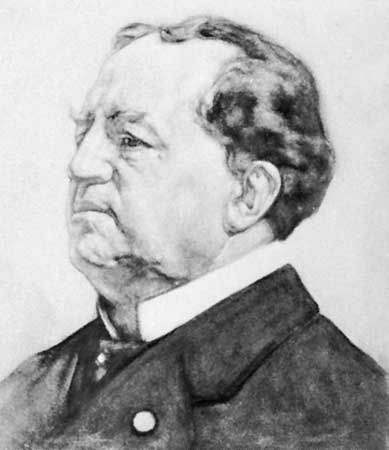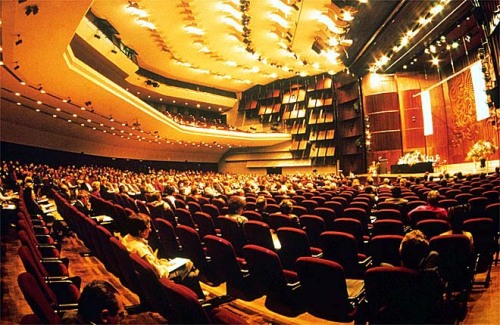Dubai was meant to be a Middle-Eastern Shangri-La, a glittering monument to Arab enterprise and western capitalism. But as hard times arrive in the city state that rose from the desert sands, an uglier story is emerging. Johann Hari reports
The wide, smiling face of Sheikh Mohammed – the absolute ruler of Dubai – beams down on his creation. His image is displayed on every other building, sandwiched between the more familiar corporate rictuses of Ronald McDonald and Colonel Sanders. This man has sold Dubai to the world as the city of One Thousand and One Arabian Lights, a Shangri-La in the Middle East insulated from the dust-storms blasting across the region. He dominates the Manhattan-manqué skyline, beaming out from row after row of glass pyramids and hotels smelted into the shape of piles of golden coins. And there he stands on the tallest building in the world – a skinny spike, jabbing farther into the sky than any other human construction in history.
But something has flickered in Sheikh Mohammed’s smile. The ubiquitous cranes have paused on the skyline, as if stuck in time. There are countless buildings half-finished, seemingly abandoned. In the swankiest new constructions – like the vast Atlantis hotel, a giant pink castle built in 1,000 days for $1.5bn on its own artificial island – where rainwater is leaking from the ceilings and the tiles are falling off the roof. This Neverland was built on the Never-Never – and now the cracks are beginning to show. Suddenly it looks less like Manhattan in the sun than Iceland in the desert.
Once the manic burst of building has stopped and the whirlwind has slowed, the secrets of Dubai are slowly seeping out. This is a city built from nothing in just a few wild decades on credit and ecocide, suppression and slavery. Dubai is a living metal metaphor for the neo-liberal globalised world that may be crashing – at last – into history.
I. An Adult Disneyland
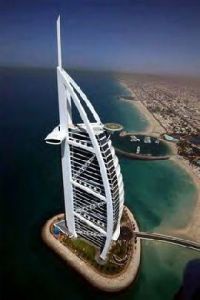
Karen Andrews can’t speak. Every time she starts to tell her story, she puts her head down and crumples. She is slim and angular and has the faded radiance of the once-rich, even though her clothes are as creased as her forehead. I find her in the car park of one of Dubai’s finest international hotels, where she is living, in her Range Rover. She has been sleeping here for months, thanks to the kindness of the Bangladeshi car park attendants who don’t have the heart to move her on. This is not where she thought her Dubai dream would end.
Her story comes out in stutters, over four hours. At times, her old voice – witty and warm – breaks through. Karen came here from Canada when her husband was offered a job in the senior division of a famous multinational. “When he said Dubai, I said – if you want me to wear black and quit booze, baby, you’ve got the wrong girl. But he asked me to give it a chance. And I loved him.”
All her worries melted when she touched down in Dubai in 2005. “It was an adult Disneyland, where Sheikh Mohammed is the mouse,” she says. “Life was fantastic. You had these amazing big apartments, you had a whole army of your own staff, you pay no taxes at all. It seemed like everyone was a CEO. We were partying the whole time.”
Her husband, Daniel, bought two properties. “We were drunk on Dubai,” she says. But for the first time in his life, he was beginning to mismanage their finances. “We’re not talking huge sums, but he was getting confused. It was so unlike Daniel, I was surprised. We got into a little bit of debt.” After a year, she found out why: Daniel was diagnosed with a brain tumour.
One doctor told him he had a year to live; another said it was benign and he’d be okay. But the debts were growing. “Before I came here, I didn’t know anything about Dubai law. I assumed if all these big companies come here, it must be pretty like Canada’s or any other liberal democracy’s,” she says. Nobody told her there is no concept of bankruptcy. If you get into debt and you can’t pay, you go to prison.
“When we realised that, I sat Daniel down and told him: listen, we need to get out of here. He knew he was guaranteed a pay-off when he resigned, so we said – right, let’s take the pay-off, clear the debt, and go.” So Daniel resigned – but he was given a lower pay-off than his contract suggested. The debt remained. As soon as you quit your job in Dubai, your employer has to inform your bank. If you have any outstanding debts that aren’t covered by your savings, then all your accounts are frozen, and you are forbidden to leave the country.
“Suddenly our cards stopped working. We had nothing. We were thrown out of our apartment.” Karen can’t speak about what happened next for a long time; she is shaking.
Daniel was arrested and taken away on the day of their eviction. It was six days before she could talk to him. “He told me he was put in a cell with another debtor, a Sri Lankan guy who was only 27, who said he couldn’t face the shame to his family. Daniel woke up and the boy had swallowed razor-blades. He banged for help, but nobody came, and the boy died in front of him.”
Karen managed to beg from her friends for a few weeks, “but it was so humiliating. I’ve never lived like this. I worked in the fashion industry. I had my own shops. I’ve never…” She peters out.
Daniel was sentenced to six months’ imprisonment at a trial he couldn’t understand. It was in Arabic, and there was no translation. “Now I’m here illegally, too,” Karen says I’ve got no money, nothing. I have to last nine months until he’s out, somehow.” Looking away, almost paralysed with embarrassment, she asks if I could buy her a meal.
She is not alone. All over the city, there are maxed-out expats sleeping secretly in the sand-dunes or the airport or in their cars.
“The thing you have to understand about Dubai is – nothing is what it seems,” Karen says at last. “Nothing. This isn’t a city, it’s a con-job. They lure you in telling you it’s one thing – a modern kind of place – but beneath the surface it’s a medieval dictatorship.”
II. Tumbleweed
Thirty years ago, almost all of contemporary Dubai was desert, inhabited only by cactuses and tumbleweed and scorpions. But downtown there are traces of the town that once was, buried amidst the metal and glass. In the dusty fort of the Dubai Museum, a sanitised version of this story is told.
In the mid-18th century, a small village was built here, in the lower Persian Gulf, where people would dive for pearls off the coast. It soon began to accumulate a cosmopolitan population washing up from Persia, the Indian subcontinent, and other Arab countries, all hoping to make their fortune. They named it after a local locust, the daba, who consumed everything before it. The town was soon seized by the gunships of the British Empire, who held it by the throat as late as 1971. As they scuttled away, Dubai decided to ally with the six surrounding states and make up the United Arab Emirates (UAE).
The British quit, exhausted, just as oil was being discovered, and the sheikhs who suddenly found themselves in charge faced a remarkable dilemma. They were largely illiterate nomads who spent their lives driving camels through the desert – yet now they had a vast pot of gold. What should they do with it?
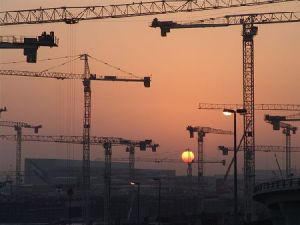
Dubai only had a dribble of oil compared to neighbouring Abu Dhabi – so Sheikh Maktoum decided to use the revenues to build something that would last. Israel used to boast it made the desert bloom; Sheikh Maktoum resolved to make the desert boom. He would build a city to be a centre of tourism and financial services, sucking up cash and talent from across the globe. He invited the world to come tax-free – and they came in their millions, swamping the local population, who now make up just 5 per cent of Dubai. A city seemed to fall from the sky in just three decades, whole and complete and swelling. They fast-forwarded from the 18th century to the 21st in a single generation.
If you take the Big Bus Tour of Dubai – the passport to a pre-processed experience of every major city on earth – you are fed the propaganda-vision of how this happened. “Dubai’s motto is ‘Open doors, open minds’,” the tour guide tells you in clipped tones, before depositing you at the souks to buy camel tea-cosies. “Here you are free. To purchase fabrics,” he adds. As you pass each new monumental building, he tells you: “The World Trade Centre was built by His Highness…”
But this is a lie. The sheikh did not build this city. It was built by slaves. They are building it now.
III. Hidden in plain view
There are three different Dubais, all swirling around each other. There are the expats, like Karen; there are the Emiratis, headed by Sheikh Mohammed; and then there is the foreign underclass who built the city, and are trapped here. They are hidden in plain view. You see them everywhere, in dirt-caked blue uniforms, being shouted at by their superiors, like a chain gang – but you are trained not to look. It is like a mantra: the Sheikh built the city. The Sheikh built the city. Workers? What workers?
Every evening, the hundreds of thousands of young men who build Dubai are bussed from their sites to a vast concrete wasteland an hour out of town, where they are quarantined away. Until a few years ago they were shuttled back and forth on cattle trucks, but the expats complained this was unsightly, so now they are shunted on small metal buses that function like greenhouses in the desert heat. They sweat like sponges being slowly wrung out.
Sonapur is a rubble-strewn patchwork of miles and miles of identical concrete buildings. Some 300,000 men live piled up here, in a place whose name in Hindi means “City of Gold”. In the first camp I stop at – riven with the smell of sewage and sweat – the men huddle around, eager to tell someone, anyone, what is happening to them.
Sahinal Monir, a slim 24-year-old from the deltas of Bangladesh. “To get you here, they tell you Dubai is heaven. Then you get here and realise it is hell,” he says. Four years ago, an employment agent arrived in Sahinal’s village in Southern Bangladesh. He told the men of the village that there was a place where they could earn 40,000 takka a month (£400) just for working nine-to-five on construction projects. It was a place where they would be given great accommodation, great food, and treated well. All they had to do was pay an up-front fee of 220,000 takka (£2,300) for the work visa – a fee they’d pay off in the first six months, easy. So Sahinal sold his family land, and took out a loan from the local lender, to head to this paradise.
As soon as he arrived at Dubai airport, his passport was taken from him by his construction company. He has not seen it since. He was told brusquely that from now on he would be working 14-hour days in the desert heat – where western tourists are advised not to stay outside for even five minutes in summer, when it hits 55 degrees – for 500 dirhams a month (£90), less than a quarter of the wage he was promised. If you don’t like it, the company told him, go home. “But how can I go home? You have my passport, and I have no money for the ticket,” he said. “Well, then you’d better get to work,” they replied.
Sahinal was in a panic. His family back home – his son, daughter, wife and parents – were waiting for money, excited that their boy had finally made it. But he was going to have to work for more than two years just to pay for the cost of getting here – and all to earn less than he did in Bangladesh.
He shows me his room. It is a tiny, poky, concrete cell with triple-decker bunk-beds, where he lives with 11 other men. All his belongings are piled onto his bunk: three shirts, a spare pair of trousers, and a cellphone. The room stinks, because the lavatories in the corner of the camp – holes in the ground – are backed up with excrement and clouds of black flies. There is no air conditioning or fans, so the heat is “unbearable. You cannot sleep. All you do is sweat and scratch all night.” At the height of summer, people sleep on the floor, on the roof, anywhere where they can pray for a moment of breeze.
The water delivered to the camp in huge white containers isn’t properly desalinated: it tastes of salt. “It makes us sick, but we have nothing else to drink,” he says.
The work is “the worst in the world,” he says. “You have to carry 50kg bricks and blocks of cement in the worst heat imaginable … This heat – it is like nothing else. You sweat so much you can’t pee, not for days or weeks. It’s like all the liquid comes out through your skin and you stink. You become dizzy and sick but you aren’t allowed to stop, except for an hour in the afternoon. You know if you drop anything or slip, you could die. If you take time off sick, your wages are docked, and you are trapped here even longer.”
He is currently working on the 67th floor of a shiny new tower, where he builds upwards, into the sky, into the heat. He doesn’t know its name. In his four years here, he has never seen the Dubai of tourist-fame, except as he constructs it floor-by-floor.
Is he angry? He is quiet for a long time. “Here, nobody shows their anger. You can’t. You get put in jail for a long time, then deported.” Last year, some workers went on strike after they were not given their wages for four months. The Dubai police surrounded their camps with razor-wire and water-cannons and blasted them out and back to work.
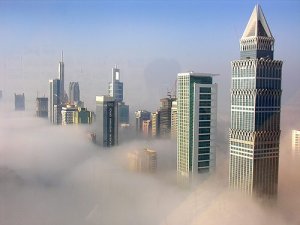
The “ringleaders” were imprisoned. I try a different question: does Sohinal regret coming? All the men look down, awkwardly. “How can we think about that? We are trapped. If we start to think about regrets…” He lets the sentence trail off. Eventually, another worker breaks the silence by adding: “I miss my country, my family and my land. We can grow food in Bangladesh. Here, nothing grows. Just oil and buildings.”
Since the recession hit, they say, the electricity has been cut off in dozens of the camps, and the men have not been paid for months. Their companies have disappeared with their passports and their pay. “We have been robbed of everything. Even if somehow we get back to Bangladesh, the loan sharks will demand we repay our loans immediately, and when we can’t, we’ll be sent to prison.”
This is all supposed to be illegal. Employers are meant to pay on time, never take your passport, give you breaks in the heat – but I met nobody who said it happens. Not one. These men are conned into coming and trapped into staying, with the complicity of the Dubai authorities.
Sahinal could well die out here. A British man who used to work on construction projects told me: “There’s a huge number of suicides in the camps and on the construction sites, but they’re not reported. They’re described as ‘accidents’.” Even then, their families aren’t free: they simply inherit the debts. A Human Rights Watch study found there is a “cover-up of the true extent” of deaths from heat exhaustion, overwork and suicide, but the Indian consulate registered 971 deaths of their nationals in 2005 alone. After this figure was leaked, the consulates were told to stop counting.
At night, in the dusk, I sit in the camp with Sohinal and his friends as they scrape together what they have left to buy a cheap bottle of spirits. They down it in one ferocious gulp. “It helps you to feel numb”, Sohinal says through a stinging throat. In the distance, the glistening Dubai skyline he built stands, oblivious.
IV. Mauled by the mall
I find myself stumbling in a daze from the camps into the sprawling marble malls that seem to stand on every street in Dubai. It is so hot there is no point building pavements; people gather in these cathedrals of consumerism to bask in the air conditioning. So within a ten minute taxi-ride, I have left Sohinal and I am standing in the middle of Harvey Nichols, being shown a £20,000 taffeta dress by a bored salesgirl. “As you can see, it is cut on the bias…” she says, and I stop writing.
Time doesn’t seem to pass in the malls. Days blur with the same electric light, the same shined floors, the same brands I know from home. Here, Dubai is reduced to its component sounds: do-buy. In the most expensive malls I am almost alone, the shops empty and echoing. On the record, everybody tells me business is going fine. Off the record, they look panicky. There is a hat exhibition ahead of the Dubai races, selling elaborate headgear for £1,000 a pop. “Last year, we were packed. Now look,” a hat designer tells me. She swoops her arm over a vacant space.
I approach a blonde 17-year-old Dutch girl wandering around in hotpants, oblivious to the swarms of men gaping at her. “I love it here!” she says. “The heat, the malls, the beach!” Does it ever bother you that it’s a slave society? She puts her head down, just as Sohinal did. “I try not to see,” she says. Even at 17, she has learned not to look, and not to ask; that, she senses, is a transgression too far.
Between the malls, there is nothing but the connecting tissue of asphalt. Every road has at least four lanes; Dubai feels like a motorway punctuated by shopping centres. You only walk anywhere if you are suicidal. The residents of Dubai flit from mall to mall by car or taxis.
How does it feel if this is your country, filled with foreigners? Unlike the expats and the slave class, I can’t just approach the native Emiratis to ask questions when I see them wandering around – the men in cool white robes, the women in sweltering black. If you try, the women blank you, and the men look affronted, and tell you brusquely that Dubai is “fine”. So I browse through the Emirati blog-scene and found some typical-sounding young Emiratis. We meet – where else? – in the mall.
Ahmed al-Atar is a handsome 23-year-old with a neat, trimmed beard, tailored white robes, and rectangular wire-glasses. He speaks perfect American-English, and quickly shows that he knows London, Los Angeles and Paris better than most westerners. Sitting back in his chair in an identikit Starbucks, he announces: “This is the best place in the world to be young! The government pays for your education up to PhD level. You get given a free house when you get married. You get free healthcare, and if it’s not good enough here, they pay for you to go abroad. You don’t even have to pay for your phone calls. Almost everyone has a maid, a nanny, and a driver. And we never pay any taxes. Don’t you wish you were Emirati?”
I try to raise potential objections to this Panglossian summary, but he leans forward and says: “Look – my grandfather woke up every day and he would have to fight to get to the well first to get water. When the wells ran dry, they had to have water delivered by camel. They were always hungry and thirsty and desperate for jobs. He limped all his life, because he there was no medical treatment available when he broke his leg. Now look at us!”
For Emiratis, this is a Santa Claus state, handing out goodies while it makes its money elsewhere: through renting out land to foreigners, soft taxes on them like business and airport charges, and the remaining dribble of oil. Most Emiratis, like Ahmed, work for the government, so they’re cushioned from the credit crunch. “I haven’t felt any effect at all, and nor have my friends,” he says. “Your employment is secure. You will only be fired if you do something incredibly bad.” The laws are currently being tightened, to make it even more impossible to sack an Emirati.
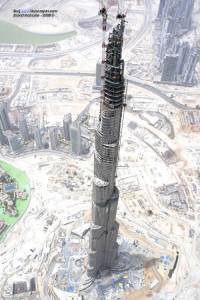
Sure, the flooding-in of expats can sometimes be “an eyesore”, Ahmed says. “But we see the expats as the price we had to pay for this development. How else could we do it? Nobody wants to go back to the days of the desert, the days before everyone came. We went from being like an African country to having an average income per head of $120,000 a year. And we’re supposed to complain?”
He says the lack of political freedom is fine by him. “You’ll find it very hard to find an Emirati who doesn’t support Sheikh Mohammed.” Because they’re scared? “No, because we really all support him. He’s a great leader. Just look!” He smiles and says: “I’m sure my life is very much like yours. We hang out, have a coffee, go to the movies. You’ll be in a Pizza Hut or Nando’s in London, and at the same time I’ll be in one in Dubai,” he says, ordering another latte.
But do all young Emiratis see it this way? Can it really be so sunny in the political sands? In the sleek Emirates Tower Hotel, I meet Sultan al-Qassemi. He’s a 31-year-old Emirati columnist for the Dubai press and private art collector, with a reputation for being a contrarian liberal, advocating gradual reform. He is wearing Western clothes – blue jeans and a Ralph Lauren shirt – and speaks incredibly fast, turning himself into a manic whirr of arguments.
“People here are turning into lazy, overweight babies!” he exclaims. “The nanny state has gone too far. We don’t do anything for ourselves! Why don’t any of us work for the private sector? Why can’t a mother and father look after their own child?” And yet, when I try to bring up the system of slavery that built Dubai, he looks angry. “People should give us credit,” he insists. “We are the most tolerant people in the world. Dubai is the only truly international city in the world. Everyone who comes here is treated with respect.”
I pause, and think of the vast camps in Sonapur, just a few miles away. Does he even know they exist? He looks irritated. “You know, if there are 30 or 40 cases [of worker abuse] a year, that sounds like a lot but when you think about how many people are here…” Thirty or 40? This abuse is endemic to the system, I say. We’re talking about hundreds of thousands.
Sultan is furious. He splutters: “You don’t think Mexicans are treated badly in New York City? And how long did it take Britain to treat people well? I could come to London and write about the homeless people on Oxford Street and make your city sound like a terrible place, too! The workers here can leave any time they want! Any Indian can leave, any Asian can leave!”
But they can’t, I point out. Their passports are taken away, and their wages are withheld. “Well, I feel bad if that happens, and anybody who does that should be punished. But their embassies should help them.” They try. But why do you forbid the workers – with force – from going on strike against lousy employers? “Thank God we don’t allow that!” he exclaims. “Strikes are in-convenient! They go on the street – we’re not having that. We won’t be like France. Imagine a country where they the workers can just stop whenever they want!” So what should the workers do when they are cheated and lied to? “Quit. Leave the country.”
I sigh. Sultan is seething now. “People in the West are always complaining about us,” he says. Suddenly, he adopts a mock-whiny voice and says, in imitation of these disgusting critics: “Why don’t you treat animals better? Why don’t you have better shampoo advertising? Why don’t you treat labourers better?” It’s a revealing order: animals, shampoo, then workers. He becomes more heated, shifting in his seat, jabbing his finger at me. “I gave workers who worked for me safety goggles and special boots, and they didn’t want to wear them! It slows them down!”
And then he smiles, coming up with what he sees as his killer argument. “When I see Western journalists criticise us – don’t you realise you’re shooting yourself in the foot? The Middle East will be far more dangerous if Dubai fails. Our export isn’t oil, it’s hope. Poor Egyptians or Libyans or Iranians grow up saying – I want to go to Dubai. We’re very important to the region. We are showing how to be a modern Muslim country. We don’t have any fundamentalists here. Europeans shouldn’t gloat at our demise. You should be very worried…. Do you know what will happen if this model fails? Dubai will go down the Iranian path, the Islamist path.”
Sultan sits back. My arguments have clearly disturbed him; he says in a softer, conciliatory tone, almost pleading: “Listen. My mother used to go to the well and get a bucket of water every morning. On her wedding day, she was given an orange as a gift because she had never eaten one. Two of my brothers died when they were babies because the healthcare system hadn’t developed yet. Don’t judge us.” He says it again, his eyes filled with intensity: “Don’t judge us.”




